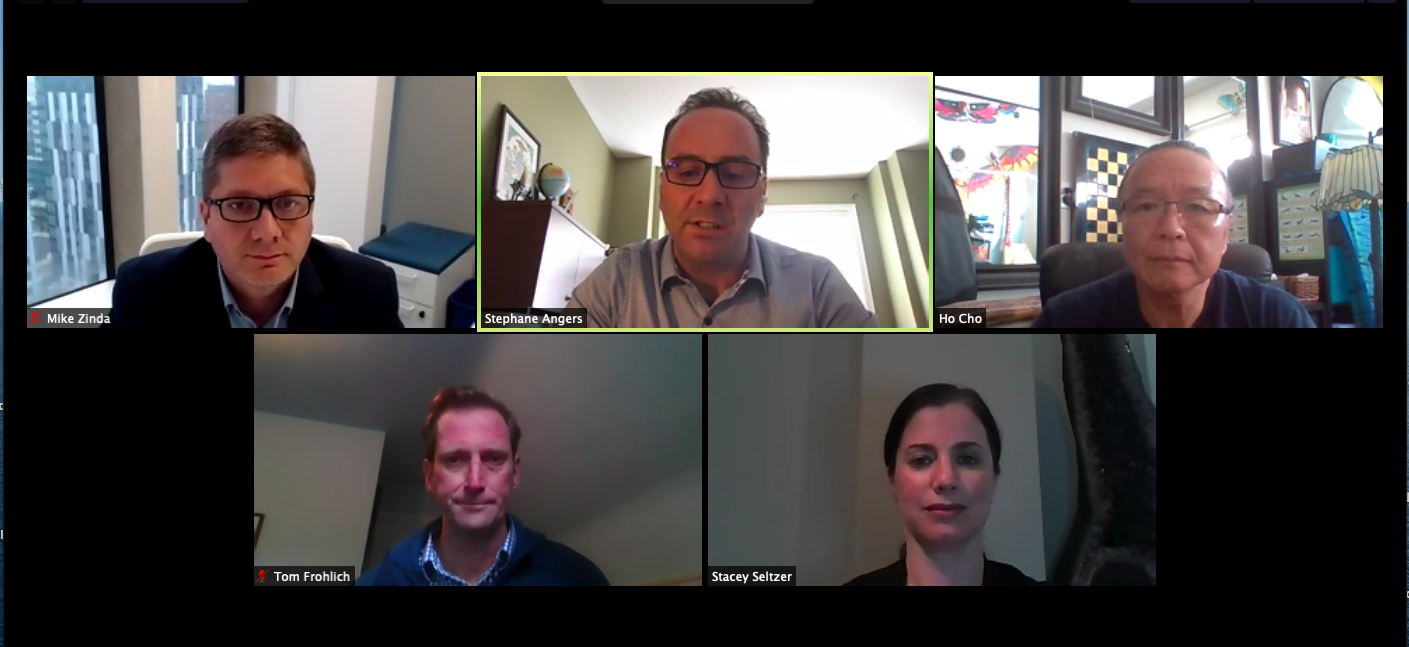The Second Annual PRiME Symposium
While the COVID-19 pandemic has kept us all physically apart, the need for the scientific community to convene and exchange knowledge and insight remains crucial for research advancement and innovation. To this regard, PRiME hosted its second annual symposium on October 13th, 2020 – virtually, this time around – with a stellar lineup representing the interface of academia and industry. With several hundred logged on to attend, this year’s symposium reached scientists both locally and abroad, for a stimulating afternoon discussion on topics in precision medicine.
The symposium began with opening remarks from the University of Toronto President, Dr. Meric Gertler, who acknowledged that “never before has the value of research been so central to everyone on the planet.” Lauding PRiME’s efforts to bring together an international audience, Dr. Gertler understood that while it is a huge undertaking and responsibility on the biomedical research community to solve the healthcare challenges of today, it is also “hugely energizing and exciting.” Dr. Shana Kelley, Director of PRiME, followed up those remarks with an introduction to PRiME and its mission to accelerate new scientific discoveries for precision medicine and empowering collaborations for research innovation. Now in its second year, PRiME encompasses over 70 faculty members across 15 departments at UofT with a growing repertoire of industry, community, and international partnerships, as well as continued success in fellowship funding for the next generation of trailblazing researchers. Looking ahead, PRiME hopes to work with others to strengthen the biotech ecosystem in Toronto to achieve worldwide impact.
The Keynote Speaker for the symposium was Dr. Chaitan Khosla, the Director of ChEM-H at Stanford University, whose research involves a multidisciplinary approach in elucidating the mechanism of immune sensitivity to dietary gluten in Celiac Disease and generating chemical tools for intervention towards druggable targets. His ground breaking work forges strong linkages between the basic exploration of disease mechanisms and the discovery of therapeutics for disease management. Dr. Khosla also discussed the importance of bridging the gaps between making discoveries and developing therapies that work in humans, acknowledging the efforts of Stanford ChEM-H and Stanford Medicine in providing infrastructure with support for preclinical activities to accelerate the development of innovative medicines. [Watch here]
The 2020 PRiME Fellows took centre stage next, with 2-minute lightning talks on their exciting, interdisciplinary research projects. Their projects focus on diagnostic or therapeutic solutions that will tackle a variety of diseases, ranging from fibrosis to COVID-19, using approaches in molecular biology, genomics, computational biology, and bioengineering. Summarizing research projects into 2 minutes and presenting it to a diverse audience is not an easy task, but each fellow delivered their presentation with clarity and enthusiasm. In the end, Ph.D. student Michael Saikali, in the laboratory of Dr. Carolyn Cummins and co-supervised by Dr. Henry Krause, received the most votes for the Audience Choice Award for the Fellow presentations. [Watch here]
The second half of the symposium switched gears to focus on industry, with company spotlights on two Canadian groups, Chinook Therapeutics and Repare Therapeutics, as well as a panel discussion with leaders from the private sector. Tom Frohlich, the Chief Business Officer of Chinook, talked about the company’s program in developing drugs for severe and rare kidney diseases [Watch here], while Dr. Michael Zinda, the Chief Scientific Officer of Repare, discussed their drug platform and screening approaches targeting genomic instability in cancer [Watch here]. The two were joined by Dr. Ho Cho, Senior Vice President of Bristol Myers Squibb, and Stacey Seltzer, a partner at Aisling Capital, in a panel on “Building Biotech Ecosystems” moderated by PRiME Associate Director Dr. Stéphane Angers. The group had a stimulating discussion on the physical and cultural infrastructure needed to facilitate research innovation and how to foster academic/industry relations to accelerate the translation of academic discoveries into potential industry assets. The group talked about challenges in the development of drug discovery and novel therapeutics, what Toronto can learn from established biotech ecosystems like Boston and the Bay Area, as well as how the current COVID-19 pandemic has and will affect the industry and marketplace in the long term. The panel brought a variety of perspectives from startup to big pharmaceutical to venture capital, providing a comprehensive outlook on Canada’s biotech sector and its future growth. [Watch here]
While it is unfortunate that this year’s event could not provide the in-person networking of our previous meeting, the Second Annual PRiME Symposium was an opportunity to share and engage across sectors with some of the best and brightest – both of today and tomorrow – in precision medicine. We hope to see you all next year in healthier times as we continue to build community and drive solutions in research, medicine, and healthcare.



